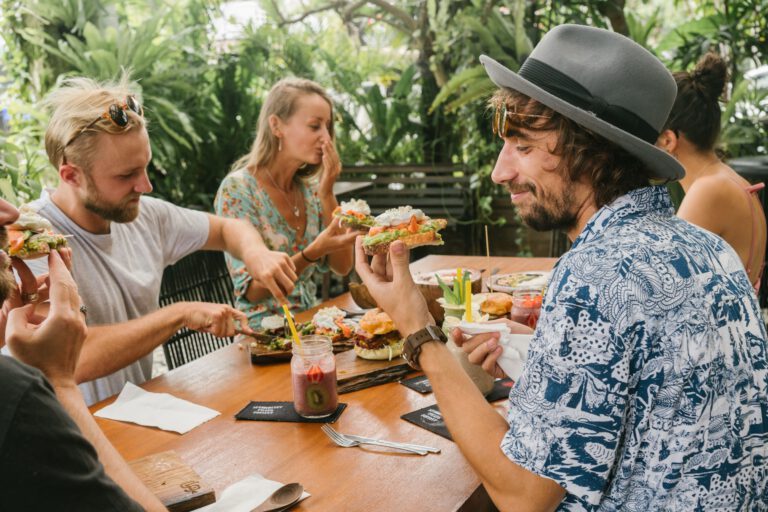This website uses cookies so that we can provide you with the best user experience possible. Cookie information is stored in your browser and performs functions such as recognising you when you return to our website and helping our team to understand which sections of the website you find most interesting and useful.
Sustainable food tourist
1o tips on how to be a more sustainable food tourist

How can food tourists become more sustainable while travelling?
As food tourism is on the rise, it is important that food tourists adjust their behaviour towards the people, economy and environment during their holidays. The growth of food tourism has positive impacts on the people and its economy. For example, creating jobs, improved understanding of the local culture and contribution to the agriculture. Unfortunately, there are also negative impacts, such as the risk of losing cultural identity, increased volume of waste and the overall price increase of goods and services. The good news is that, there are several ways how food tourists can be more sustainable and contribute to the protection of the people, economy and environment. This will help food tourists to enjoy their trip and leave with the confidence that the food destination will not be damaged by their presence. In the following you can find ten top tips on how food tourists can behave more sustainably during their trip (United Nations, 2022).
1. Food tourists should say “no” to single-use plastic
2. Food tourists should be ‘water-wise’
3. Food tourists should buy and eat local
Whether at home or abroad, food with a huge carbon footprint should be avoided. Food tourists should assure they eat food which is in season and has not been shipped halfway around the world. When food tourists buy and eat local, they help to boost the local economy, support local communities and help to reduce the destination’s carbon footprint from transporting the goods. For instance, food tourists can choose food from the menu which is sourced locally instead of eating food which is imported by the destination (United Nations, 2022).
4. Food tourists should eat more plants
Food tourists should focus on vegetables, beans and nuts. Plant-based meat allows food tourists to enjoy the taste of meat at a fraction of the environmental cost, since 30% to 90% less greenhouse gas is emitted than conventional meat (United Nations, 2022). Plant-based meals are recorded to typically have a ten to fifteen times smaller climate impact than that of animal products. The 2021 climate change report by the Intergovernmental Panel on Climate Change describes plant-based diets as a major opportunity for mitigating and adapting to climate change (Ha, 2022).
5. Food tourists should eat at socially responsible restaurants
Food tourists should get in touch with local restaurants, farm to fork establishments and those specialising in traditional local cuisine (United Nations, 2022). As visiting local restaurants where social responsibility is taken seriously attention is given to the people, the planet as well as the profit. With regard to ‘planet’, a restaurant with a social conscience will prioritise products produced locally. While ‘people’ and ‘profit’ concern respecting employees and customers. This implies offering prices that are adapted and profitable for the entire supply chain. This guarantees that everyone involved will make profit and not only the restaurant. Chalana is a restaurant in Peru which is famous for its 0 kilometres concept. It presents a unique concept in the city of Paracas. Dishes with products from local fishermen and farmers are offered. Furthermore, the cold dishes are prepared without using electricity or fuel (Marriott International, n.d.).
6. Food tourists should choose an ethical operator
7. Food tourists should share a ride
Transport is a major contributor to the carbon footprint in the tourism industry. Instead of private taxis, food tourists should explore using public transportation like trains, buses and shared taxis. A bicycle can also be used, which offers a convenient and cheaper way to explore and learn about a place (United Nations, 2022). For instance, food tourists can look for an UberX Share ride in the destination. Uber is currently active in more than 10,000 cities worldwide and Uber’s employees in Europe are switching to electric cars faster than the average European car driver (Horckmans, 2021).
8. Food tourists should consider a homestay
Staying with a local resident is a nature-friendly option that allows food tourists to get close and personal with the local culture and its customs. Staying at local homestays can uplift communities by providing income and give food tourists a better peek in the local culture (United Nations, 2022). An example is Ubud, Bali where visitors have the possibility to stay with local residents in their homes. This is a unique option for food tourists since many homestays offer food services as well. The local breakfast, lunch and dinner can be prepared by the local hosts as well. Besides that, food tourists are able to join the hosts in their daily activities, such as helping on Balinese farms and rice fields (Homestay, n.d.).
9. Food tourists should not leave a trace
Food tourists can make a mark by not leaving a trace behind in the culinary destination and ensure to leave only soft footprints, and not the environmental one (United Nations, 2022). For instance, food tourists can bring their own container for purchases at a food market, this will contribute to less waste in the destination (Savery Raz, 2022).
10. Food tourists should be informed
Conclusion
In short, food tourists travelling to tourism destinations can bring many positive impacts for the local people and the economy. However, there are negative impacts too. By adjusting the behaviour of food tourists during their holiday, a contribution is made to maximise the positive impacts and minimise the negative impacts of a destination. In the first place, food tourists should say “no” to single-use plastic as this can take more than 1,000 years to degrade. Instead, food tourists can choose reusable bottles wherever they travel to which contribute to less plastic waste in the ocean.
Further, food tourists should be “water-wise”, this points to making choices that help save water for the local residents. A simple way to accomplish this, is to prevent a daily change of sheets and towels during hotel stays, this will contribute to saving millions of litres of water annually. Also, it is important that food tourists buy and eat local, since food from abroad contributes to a huge carbon footprint compared to local food.
Additionally, food tourists should choose plant-based meat instead of conventional meat as this will allow food tourists to enjoy the taste of the meat at less environmental cost. In fact, food tourists should also eat at socially responsible restaurants. Furthermore, choosing an ethical operator is important as well, which prioritises the environment, uses its resources efficiently and respects the local culture.
Moreover, food tourists should consider sharing a taxi during their trip since this is considered a more sustainable option compared to private taxis. Homestay is a nature-friendly option which can be considered too, since food tourists have the opportunity to get closer with the local culture. Lastly, food tourists should be informed on how sustainably food tourism benefits the local people. As this will help to ensure that food tourists apply all the aforementioned tips. As a result, a contribution is made to the sustainability of their favourite food destination.
Gers Tromp, 22.11.2022
Sources
Albeck-Ripka, L. (n.d.). Be a more sustainable traveler. Retrieved from https://www.nytimes.com/guides/travel/how-to-travel-sustainably
CodeBlue. (2022). Food tourism can help regenerate our planet. Retrieved from https://codeblue.galencentre.org/2022/10/18/food-tourism-can-help-regenerate-our-planet/
Eat Mexico (n.d.). Sustainable food tours. Retrieved from https://eatmexico.com/sustainable-food-tours/
Ha, M. (2022). Food tourism is the perfect entrée for greener travel. Retrieved from https://skift.com/2022/04/22/food-tourism-is-the-perfect-entree-for-greener-travel/
Holling, A. (2021). How to be a responsible traveller. Retrieved from https://www.introtravel.com/travel-blog/how-to-travel-responsibly/
Horckmans, M. (2021). Elektrische wagens tekenen voor amper 5 procent van de Europese ritten van Uber. [Electric cars sign up for barely 5 percent of Uber’s European rides]. Retrieved from https://businessam.be/elektrische-wagens-tekenen-voor-amper-5-procent-van-de-europese-ritten-van-uber/
Impact Travel Alliance. (2020). Go global, eat local: The relationship of travel, food and sustainability. Retrieved from https://www.impacttravelalliance.org/go-global-eat-local-the-relationship-of-travel-food-and-sustainability/
Marriott International, Inc. (n.d.). Hotel Paracas, a luxury collection resort. Retrieved from https://www.espanol.marriott.com/hotels/hotel-information/restaurant/details/piolc-hotel-paracas-a-luxury-collection-resort-paracas/5976374/
Savery Raz, D. (2022). How zero-waste travel is becoming a reality. Retrieved from https://www.lonelyplanet.com/articles/zero-waste-travel-trend
Sircle Collection. (n.d.). Sustainability. Retrieved from https://sirclecollection.com/sustainability/
United Nations Environment Programme. (n.d.). Reframing tourism to address plastic pollution. Retrieved from https://www.unep.org/news-and-stories/story/reframing-tourism-address-plastic-pollution
United Nations. (2022). Is it possible to be a ‘sustainable tourist’? 12 ways to make a positive impact on your travels. Retrieved from https://news.un.org/en/story/2022/10/1129247
Waby, T. (2022). Why New Zealand is leading the way with regenerative travel. Retrieved from https://www.lonelyplanet.com/articles/regenerative-tourism-new-zealand
WWF (n.d.). Six tips to help you eat more sustainably. Retrieved from https://www.wwf.org.uk/updates/six-tips-help-you-eat-more-sustainably
